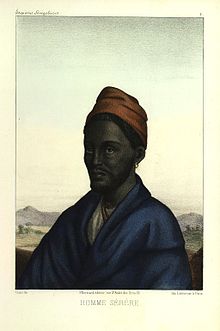Maad a Sinig Ama Joof Gnilane Faye Joof
| Maad a Sinig Ama Joof Gnilane Faye Joof | |||||
|---|---|---|---|---|---|
 |
|||||
Maad a Sinig Ama Joof Gnilane Faye Joof. King of Sine. Reigned : c. 1825 to 1853. From The Royal House of Semou Njekeh Joof. He is one of few pre-colonial Senegambian kings imortalised in a portrait. Watercolor Sketches of David Boilat in Esquisses sénégalaises 1853, original portrait taken in 1850 when Boilat visited Joal.
|
|||||
| Reign | 1825–1853 | ||||
| Coronation | c. 1825 Crowned at Diakhao, Kingdom of Sine, present-day |
||||
| Predecessor | Maad a Sinig Njaak Wagam Gnilane Faye (Maad a Sinig). Ama Kumba Mbodj (regent). |
||||
| Heir-apparent | Maad a Sinig Kumba Ndoffene Famak Joof | ||||
| Born |
Diakhao, Kingdom of Sine, present-day |
||||
|
|||||
| House | The Royal House of Semou Njekeh Joof founded by Maad Semou Njekeh Joof in the 18th century | ||||
| Father | Sandigui N'Diob Niokhobai Joof | ||||
| Mother | Lingeer Gnilane Faye | ||||
| Religion | Serer religion | ||||
| Full name | |
|---|---|
| Maad a Sinig Ama Joof Gnilane Faye Joof |
Maad a Sinig Ama Joof Gnilane Faye Joof (many variations of his name: Ama Joof, Amat Diouf, Amajuf Ñilan Fay Juf, Amadiouf Diouf, Ama Diouf Faye, Ama Diouf Gnilane Faye Diouf, Ramat Dhiouf, etc.) was a king of Sine now part of present-day Senegal. He reigned from c. 1825 to 1853. He was fluent in several languages. He came from The Royal House of Semou Njekeh Joof (the third and last royal house founded by the Joof family of Sine and Saloum in the 18th century). Maad a Sinig (variations: Mad Sinig etc.) means king of Sine in the Serer-Sine language. The term Bur Sine (variations: Buur Sine or Bour Sine) is also used interchangeably with the proper title Maad a Sinig or Mad a Sinig. They both mean king Sine. Bour Sine is usually used by the Wolof people when referring to the Serer kings of Sine. The Serer people generally used the term Maad a Sinig or Mad a Sinig when referring to their kings.
The king was the son of the Sandigue Ndiob Niokhobai Joof and Lingeer Gnilane Faye. Lingeer means royal princess or queen mother.Sandigue Ndiob (or Sandigui N'Diob) is a title of nobility and a rather important and powerful figure in pre-colonial Sine. It designates the village chief of N'Diob (var: Ndiob) near the border of Baol. His father (the Sandigue Ndiob) belongs to the Serer paternal dynasty of Sine and Saloum of the family Joof. He was a royal prince himself and a warlord. Lingeer Gnilane Faye (his mother), partains to the Faye family of Sine. On her maternal line she was a member of the Guelowar maternal dynasty.
Ama Joof Gnilane Faye Joof was crowned king of Sine in his early teens, when he was about 12 or 15 years. Although dynastic wars between the various royal houses were prevalent at the time, he succeeded to the throne without having to engage in battle. His father, the powerful warlord and Sandigui N'Diob Niokhobai joof, secured his succession to the throne of Sine by defeating other royal houses in battle. Niokhobai Joof was not eligible to rule at that time. Although a member of the Joof Dynasty, his mother was a noble, but was not a Guelowar (the reigning maternal dynasty). To become a king, a prince must be able to trace royal descent both on his paternal and maternal line. Having secured the succession of his son, he permitted the uncle of Ama Joof Gnilane Faye Joof (Ama Kumba Mbodj, variations: Ama Coumba M'Bodj or Amakoumba Mbodg) to rule as regent until Ama Joof Gnilane Faye Joof reached maturity. His son (Ama Joof Gnilane Faye Joof) was quite young at the time, he was about 7 years old. When Ama Kumba Mbodg and his younger brother Bakar Mbodg plotted to disinherit Ama Joof Gnilane Faye Joof, which went against the agreement, Niokhobai Joof commanded the Joof family of Sine and Saloum for the last time and defeated the Mbodg princes and their armies at The Battle of Tioupane. The throne of his son secured, Ama Kumba Mbodj was exiled, and he had to seek refuge in Mbodiène. Ama Kumba Mbodj was still living in exile when the French missionaries started arriving in 1848. According to some, the Sandigui N'Diob was the most powerful man in the country and had total control of country.
...
Wikipedia
